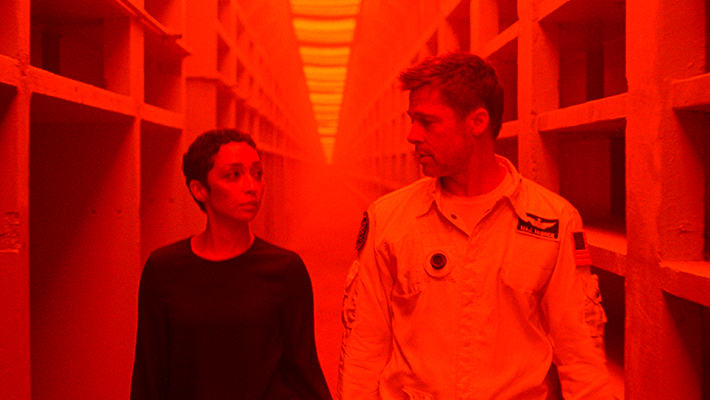Can a movie be simultaneously infuriating and inspiring? Ad Astra (“to the stars” in Latin, because the kids love Latin) is director James Gray’s biggest, boldest, most ambitious and epic film to date, and easily his best. And yet… you know how some filmmakers seem simpático and others just rub you the wrong way? Gray is the latter for me.
Even competing against Gravity, Interstellar, First Man, Apollo 11… etc., Ad Astra‘s trip beyond the atmosphere stands out as one of the most thrilling. It gives us moon pirates, an antenna to the stars, an anti-matter weapon orbiting Neptune, and Tommy Lee Jones, all without losing its tone of practiced groundedness. It’s multiplex eye candy and an arthouse brooder simultaneously. And yet after all these mind-expanding revelations and billions of miles of space travel, I couldn’t help but be disappointed by what we found out there. (You traveled to the edge of the known universe and all you found there were daddy issues? Oy, more like DAD Astra, am I right?)
Brad Pitt, who looks great in an angular military haircut (who am I kidding, he looks great in anything), plays Roy McBride, a steely astronaut who in the first scene survives some kind of power anomaly while working on the rungs of some kind of giant Earth-to-space antenna (nice to see those still have utility ladders on the outside). It’s a hell of a scene, combining Christopher Nolan’s sense of epic scale and wonder with Guillermo Del Toro’s ability to just sort of drop us into a universe where the rules are totally different and have us all caught up and ready to go lickety-split. “Oh damn, we got space antennas in this universe? Fine, let’s do it.”
In the debriefing scene that follows, Roy’s superiors note that throughout his sphincter-tightening near-death experience in space, which saw him tumble off a space antenna and have to parachute through a disemboweling gauntlet of flying metal, his heart rate never went above 80. That’s Roy’s “thing,” apparently, the ability to remain super chill in near-death situations. Another of Ad Astra‘s conceits is that NASA has automated shrinks, where Roy gets to do a kind of talk therapy with a future Siri and let us into that beautiful noggin of his.
Roy compartmentalizes, see, it’s what the job requires (see also, the theme of First Man). Like all movie astronauts, he also has an estranged love interest out there, his ex-wife, played by Liv Tyler, a throwaway character who exists only in video messages to complain that Roy is never there.
Roy has more important things to worry about, luckily, like his next mission. It turns out that his father, the space martyr Clifford McBride (played by Tommy Lee Jones), believed to have disappeared 16 years ago on “The Lima Project,” a mission beyond the heliotrope to search for intelligent life, might actually be alive out there.
GO TO SPACE AND KILL YOUR DAD! GO TO SPACE AND KILL YOUR DAD! Okay so that’s not exactly the mission but I really like typing it. (In space, no one can hear you kill your dad).
Roy’s larger mission involves a series of smaller ones, first to the moon and then to Mars, both thrilling interludes that go in directions you’d never see coming but are sort of irrelevant to the larger story. Roy eventually cuts some corners in his quest for knowledge on the way to the father/son reunion, and the questions become: how much is Roy like the father he always idolized and how much did he really know him? And: how much has the McBrides’ thirst to discover the unknown grown out of a boredom/detachment/disgust with the known?
These are deep psychological questions that… I just don’t care about that much? At least not compared with the alternatives presented here. It’s like Brad Pitt traveled to the ends of the solar system just to stare at his own belly button. In combining Guillermo Del Toro’s worldbuilding and Christopher Nolan’s sense of grand scale, James Gray (Lost City Of Z, The Immigrant) also seems to have inherited Del Toro’s tendency to fixate on the dullest parts of an otherwise amazing story and Christopher Nolan’s unrelenting humorlessness.
If you played a drinking game where you chugged every time one of the characters in Ad Astra smiled you’d go home sober. I know, I know, it’s not a comedy, it’s a very serious space drama, but any fictional world feels a little less interesting, a little less vivid, without at least the possibility of a moment of levity. That total lack of lightness also puts a lot of pressure on Ad Astra to be as profound as it seems to think it is. Pretty as it is, I’m not convinced.
Lingering shots of Brad Pitt’s steely blue eyes are great (what drives him? why can’t he be a better husband? why can’t he kill his space dad?) but it’s hard not to want more from Tommy Lee Jones playing an ornery space hermit. That’s the role Tommy Lee Jones was born to play!
Call it nitpicking, to criticize a movie that gives us almost 90 minutes of majesty, wonder, and moon piracy before dropping the ball, or call it the victim of the sky-high expectations it created for itself in the first place. It’s a movie you should definitely see (and how could you resist?). Just… maybe don’t expect to leave satisfied.
‘Ad Astra’ opens this weekend in theaters nationwide. Vince Mancini is on Twitter. You can access his archive of reviews here.







